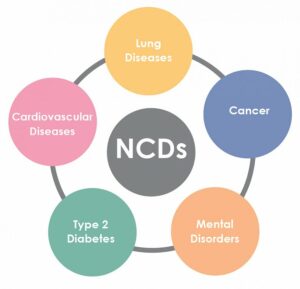Non-Communicable Diseases account for 70% of deaths worldwide – Report
 Dr Dennis Laryea, a Physician with the Diabetic Unit of the Komfo Anokye Teaching Hospital, Kumasi, says Non-Communicable Diseases (NCDs) are collectively responsible for almost 70 per cent of all deaths worldwide.
Dr Dennis Laryea, a Physician with the Diabetic Unit of the Komfo Anokye Teaching Hospital, Kumasi, says Non-Communicable Diseases (NCDs) are collectively responsible for almost 70 per cent of all deaths worldwide.
NCDs generally include cardiovascular diseases, diabetes mellitus, cancers, injuries (intentional and unintentional), asthma/COPD, sickle cell diseases, and mental health conditions (depression, anxiety disorders, schizophrenia).
He gave the statistics while speaking on NCDs and why the nation should be worried about it taking into consideration measures to control it, at a three-day training programme organised for health practitioners in Accra.
The practitioners from various parts of the Greater Accra Region were Medical Doctors, Physician Assistants, Midwives, Nurses, Pharmacists, and Health Promotion Officers.
Dr Laryea said almost three quarters of all NCD deaths, and 82 per cent of the 16 million people who died prematurely, or before reaching 70 years of age, occurred in low and, middle income countries.
He said cardiovascular diseases accounted for most NCD deaths, which was about 17.9 million annually, followed by cancers (9.3 million), respiratory diseases (4.1 million) and diabetes (1.5 million).
These four groups of diseases, he said, accounted for over 80 per cent of all premature NCD deaths.
Moreover, someone aged 30 to 70 years dies prematurely from NCDs every two seconds and poorer people are disproportionately affected by NCDs and mental health conditions.
On the factors that accounted for the increasing NCDs in the country, he said increasing wealth expectancy and leading of sedentary lifestyles and physical inactivity, unhealthy diet, increasing consumption of alcohol and tobacco, and air pollution played a major role in it.
Other important risk factors are raised blood pressure, overweight/obesity, raised blood glucose, and cholesterol.
Unfortunately, he noted that the cost of managing NCDs, its lifelong treatment, laboratory tests and treatments were very expensive.
Dr. Laryea entreated health practitioners at the Community Health Planning and Services (CHPS) compounds, to take keen interest in checking for NCDs among their clients and risk factors in their system, including blood pressure, sugar level, weight, and cholesterol, as they were simple interventions at the basic care level that could help to keep patients safe.
“Our practitioners, please help to reduce the number of diabetic patients who do not feel their feet’ sensation to reduce amputation by paying special attention to their health,” he said.
Source: GNA
